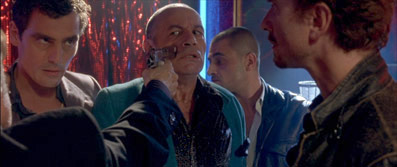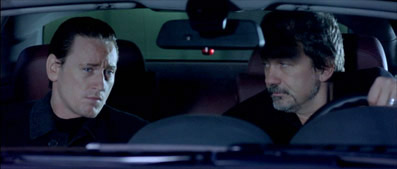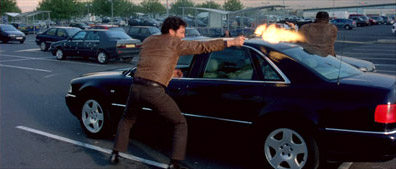|
On the basis of his first three films, writer-director Frédéric Schoendoerffer appears to be carving a niche for himself as a creator of busy crime thrillers with bluntly descriptive titles. In 2000 he gave us Scènes de crimes [Crimes Scenes], which was followed in 2004 with Agents secrets [Secret Agents], and now we have Truands, which translates simply as Gangsters, something its UK distributor have chosen to ignore in favour of the somewhat bemusing Paris Lockdown. Well it is set in Paris, at least.
Gangster movies have a lot to answer for. Many of the genre's highpoints are rated amongst the best that cinema has to offer, but in recent years a string of trashy gangster wannabe titles – usually made by people who've never met a real gangster but are in love with the idea of what they think being one is all about – have inspired a particularly tiresome amateur offshoot, the student gangster video. These are movies – a term I use loosely since they're almost all shot on mini-dv and rarely run for longer than 15 minutes – with bugger all in the way of plot or characters, in which the filmmakers and their scrawny mates, usually dressed in the same clothes they wear every day, threaten and shoot each other with plastic guns, shout most of their ill-written dialogue, and make loud and liberal use of the word 'fuck'. They are, by and large, an excuse for the physically unimposing to act like tough guys and indulge in an adolescent predilection for bloody violence.

Now Paris Lockdown is no student gangster film, not by a long shot, being slickly assembled, professionally cast, decently performed, and boasting boffo production values. But it does share with those student projects a preference for blasting the audience with gangster-type incidents and chat rather than creating characters with any real depth. Thus, drug deals are done, friends are betrayed, enemies are shot to pieces, the unfortunate are violently tortured, and women are on hand almost purely to service the base desires of the men. The tricky bit, at least in the first third, is following just who is doing any of this to whom, how exactly they are related to each other, and in some cases who they actually are.
Names begin to register with the rapid passing of scenes. There's Claude Corti (Philippe Caubère), a middle-aged gang boss whose hold on power is starting to look increasingly shaky, thanks in part to the personal ambitions of his many associates. Then there's smooth but deadly Francky (Benoît Magimel), an ice-cool killer that Claude desperately wants on his team, which is more than can be said for Francky's partner Jean-Guy (played by cop turned actor Olivier Marchal), a man Claude neither trusts nor likes. Then there's Larbi (Tomer Sisley), a follower of Islam who's just out of jail and appears to be building a small firm of his own, perhaps to challenge even the mighty Claude and his organisation. Characters and their story threads come and go and the film darts between at a speed that would be easier to cope with if we had any emotional investment in any of them. But the editing just won't let us settle on one person for long enough to easily recognise them, let alone care too much for their fate. If you're in it for incident then you'll have few complaints, but if you like your movie characters to register beyond the superficial then you'll likely be left wanting.
It doesn't help that there's nothing here that those familiar with the genre won't have seen a number of times before, and often with more fully developed characters. This does tend to cast a curse on even the film's best scene. The car-park shoot-out that erupts when a drug deal goes bad is most impressively staged but remains deep in the shadow of the showpiece gun battle from Michael Mann's Heat, a scene that was not only breathtaking in organisation and scale, but also – due in no small part to our emotional involvement with the participants – genuinely tense. Curiously, the most interesting character here is Claude's right-hand heavy Mourad, a man who rarely speaks and for the most part hovers solidly in the background, but is played with just the right note of confident but controlled danger by Alain Figlarz, who also cropped up as bad guy Dimitri Nicolov in Julien Leclercq's Chrysalis, anither French genre work that was released recently on UK DVD by Metrodome.

A degree of character identification kicks in perilously late when Claude is banged up for a couple of years and the focus shifts to Francky, a man interesting more for the studied cool of Magimel's portrayal (imagine if the young Robert De Niro had played Michael Corleone instead of his father and you'll get the idea) than anything he actually does. Indeed, when a course of action he embarks on turns out not to be the double-bluff I was expecting but exactly what it claimed to be, I didn't know whether to be surprised or disappointed. Given the lack of ambiguity over motivation and my failure to engage in any way with the person beneath the surface cool, not to mention the supremely limp ending, I had to go with the latter.
A solid 2.35:1 anamorphic transfer which scores on detail, contrast and black levels and displays reasonable shadow detail in darker scenes without any visible digital glitches, even on areas of single colour.
The soundtrack is French 5.1 only and a decent mix, with a good dynamic range and some clear separation, but not much use of the surrounds beyond music and location atmospherics. The bass really kicks on gunshots and grenade blasts, however.
Diary of Paris Lockdown (51:47)
A loosely structured and commentary-free look behind the scenes that covers quite a bit of ground, including the preparation and testing of prosthetic effects, firearms training, the planning and filming of a number of scenes and even the editing and music composition. Much of it is interesting in the way such material tends to be, but the decision to present the cast and crew interviews as huge blow-ups from monochrome CRT screens and make the sound as tinny as possible is an artistic decision that has bollocks written all over it.

Also included are the English Trailer (1:40) and the International Trailer (2:00).
If you rate your gangster movies on a meter that favours surface detail and pace over content and you're not too worried about things like originality then Paris Lockdown may well fit your pistol. But in a genre that is already busy with shallow tales of dodgy blokes doing blokey sex and violence, Paris Lockdown may well find itself in iffy company at the wrong end of a genre whose leading lights have set the bar pretty damned high.
|